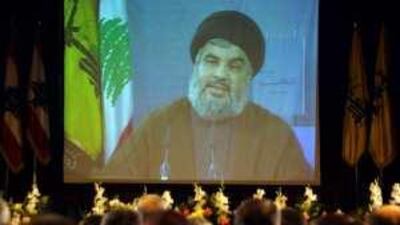BEIRUT // Hizbollah is no longer simply a liberation movement but represents a successful global and regional trend of resisting US and Israeli hegemony and interference, according to the group's first political manifesto in almost 25 years. The document was released by the Hizbollah general secretary, Hassan Nasrallah, yesterday during a press conference and speech delivered from a secure video link.
"Through its long path and its depicted victories, the resistance's project has grown from a liberation power to a balance and confrontation one to a defence and deterrence one in addition to its political and internal role as an influencing basis in building the just and capable state," Mr Nasrallah told journalists, party officials and supporters who attended the live video conference in Beirut's southern suburbs.
In many ways, the document appears intended to codify Hizbollah's well-known transformation from a guerrilla group fighting Israel into Lebanon's most powerful political movement and a leader in an alliance of non-aligned groups and nations opposed to US policies around the world. The press conference was a highly unusual public step for Mr Nasrallah, who is widely believed to be a candidate for targeted assassination by the Israelis for his role in leading the militant group since 1992, seven years after it was founded.
Mr Nasrallah was recently re-elected secretary general. He said that through its success in liberating most of southern Lebanon, and in derailing US and Israeli plans for the region, Hizbollah had transcended its initial role as a liberation movement and developed into a regional symbol for opposing tyranny. "The resistance in Lebanon has evolved from a Lebanese national value to an Arab and Islamic value and has become today an international value that's taught all over the world," he said.
"What strengthens the international hegemony system crisis are the actual collapses in the financial markets and the entry of the US economy in a situation of failure," he said. "Therefore, it's possible to say that we are amid historical transformations that signal the retreat of the US role as a predominant power and the demise of the Zionist entity." This retreat, he argued, was the result of the failure of the US and Israeli adventurism in the region, the recent worldwide economic slowdown is evidence that the programme of globalisation pursued by the United States had failed and that its desire to control the region's energy resources make it impossible for Hizbollah "to see America as a friend".
"The failure of the US strategy does not mean it will easily stop interfering, but will make an effort to protect its strategic interests," he said. "The American arrogance has left no choice to our nation and people but the choice of resistance, at least for a better life, and for a humanitarian future, a future governed by relations of brotherhood, solidarity and diversity at the same time in a world of peace and harmony."
To address many concerns about Hizbollah's loyalties, as many Lebanese perceive it to be a religious organisation more beholden to Iran than Lebanon, Mr Nasrallah offered an impassioned defence and argued against any plan to divide the country along sectarian lines. "Lebanon is our homeland and the homeland of our fathers, ancestors. It's also the homeland of our children, grandchildren and the coming generations," he said. "We want Lebanon for all Lebanese alike, and we want it unified. We reject any kind of segregation or federalism, whether explicit or disguised. We want Lebanon to be sovereign, free, independent, strong and capable. We want it also to be strong, active, and present in the geopolitics of the region."
Mr Nasrallah also took aim at what many consider the biggest weakness of the Lebanese political system, its confessional system that allocates political power among the various religious groups in Lebanon without regard to their actual size. Lebanon's Maronite Christian minority, in the eyes of many Muslims, receives an outsized share of this power based on nostalgia for the French Mandate period, when Maronites were a much larger and powerful portion of the electorate.
Shiite Muslims are barred from the two top offices in Lebanon, with the presidency assigned to a Maronite, while the prime minister's chair is reserved for a Sunni. Hizbollah, with broad support from Shiite Muslims, which compose the single largest group in Lebanon, would greatly benefit from removing this system and replacing it with a representative democratic system. Elias Muhanna, who edits the influential Qifanabki blog on Lebanese political affairs, noted that it was the lack of religious rhetoric and call for an end to sectarianism that stood out most compared to the group's last manifesto, issued in 1985.
"The 1985 Open Letter belonged to the genre of revolutionary manifestos, spiced with a good deal of fundamentalist religious rhetoric. The new programme is emblematic of a much more sophisticated political organisation," he said. "The fire-and-brimstone about America and Israel is still there, but the invitation to Lebanon's Christians to convert to Islam and to establish an Islamic state have been thrown out and replaced with a call to dismantle political confessionalism and replace it with majoritarian democracy."
The announcement came just a day before the newly formed national unity cabinet is scheduled to discuss and approve a ministerial statement that would continue to support Hizbollah's right to keep its large weapons stockpiles until all Lebanese lands are freed and secured from outside threats. Several Christian parties have criticised the statement as allowing Hizbollah to maintain its status as a "state within a state" and to pursue its own security and military policies without regard to their effect on the rest of Lebanon, but the measure is still expected to pass.
@Email:mprothero@thenational.ae

